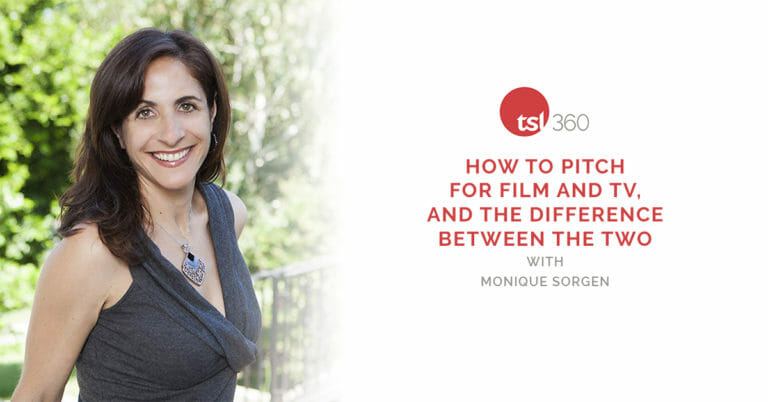By Rebecca Norris · May 2, 2019

Have a big pitch coming up? Sharing scripts and ideas with producers and execs can make even the most experienced writer nervous, but believe it or not, pitching can be fun! In her new TSL 360 video, writer/director Monique Sorgen takes the mystery out of pitching, and gives great tips on how to make the whole experience more relaxed, conversational, and even enjoyable.
Ms. Sorgen has been hired to write both scripted and unscripted television and film, for independent productions as well as major studios and networks, local and foreign. She has also directed short films and music videos that have been picked up for distribution. Most recently, her romantic comedy novel, How Long You Should Wait to Have Sex, became available in several foreign languages. Ms. Sorgen is a graduate of UCLA’s School of Theater, Film, and Television, and currently teaches at UCLA Extension.
If you don’t already have a TSL 360 membership, be sure to join TSL 360 for a FREE 3-day trial membership! TSL 360 is the LARGEST screenwriting education content library where you can learn from the best in the biz, featuring dozens of masterclasses, deep-dive interviews and lectures from Academy Award-winning screenwriters, Emmy-winning TV writers, producers, agents, major studio executives – all in one place.
Monique explains that the purpose of pitching is simply to “…present your idea to a buyer in a way that is clear, easy to understand, and exciting. And what you’re trying to do is see if this idea is going to be up their alley or not.”
She also cautions writers to remember that, “…sometimes no matter how great of a job you do presenting your idea, if it’s not what they’re looking for, if it’s not what they need right now, they’re not going to buy it from you… most companies, most financiers have a mandate… at a company it comes from very, very high up, and they have meetings every week where they say, ‘Okay, we’re looking for this now.’ And if you came in on the wrong week, you came in on the wrong week.
So that’s just something to keep in mind, that you might do a great pitch, and it’s not your fault. So, that said, I would hope that everyone has researched the company that they’re going to talk to, and the financiers, and kind of found out what they’ve done in the past, or if they’re changing their direction, that you have gotten into finding that out at as well, so you’re not wasting anybody’s time. That’s very important.” [:30 – 1:36]
Monique stresses that the title of your project is an important part of your pitch because “…it instantly tells people, this is what I’m going to be talking to you about…
The next important thing is loglines, which is just a one or two sentence explanation of what your movie is about, and it should include a strong hook and give a sense of what the tone is as well. When you’re pitching, you want to be as clear and simple as you can… your job is to tell a great story. If you’re sitting around a campfire, everybody would be enthralled by the story you’re telling… Pitching isn’t rocket science; you’re just telling them the story: beginning, middle, and end.” [1:44 – 3:29]
It’s helpful to know in advance that your pitch may get interrupted. As Monique explains, “…they might have questions or something they didn’t quite understand along the way, and you need to know your pitch so well that if you do get interrupted, you can stop, answer their question, have a conversation, maybe have a coffee, and then still know where to go to get back to your storyline.” [3:30 – 3:50]
Monique stresses that the pitch shouldn’t sound like a rehearsed speech. Instead, “…it should sound like a conversation. You’re just sitting in a room with a couple of people, sometimes there’s one person, sometimes three, four five people, and you’re telling them a story. Think back to the campfire. You’re not standing up and giving a speech. That’s really important. What you want to do conversationally is kind of make it feel like you’re just coming up with it as you’re telling it to them… to that end, I will write out the entire pitch exactly the way that I talk. I will include the little sidebars that I plan on saying, the little jokes, and then I’ll memorize it all, and say it as if I were a stand-up comedian or an actor.
So I do advise, if you’re going to be pitching a lot, take a couple of acting classes or stand-up comedy. Just to get yourself comfortable with saying things naturally that you actually have scripted. Being conversational makes the whole experience fun for everybody, but it also gives you the opportunity to show your passion. Because when you’re pitching… you’re selling your passion for this idea. Passion is contagious… and you want them to feel as passionate about this idea as you do.” [4:10 – 6:19]
There are three important questions that you’ll likely get asked in a pitch: “…why does this movie have to get made? Why does it have to get made now? And why are you the person who should be telling this story?” Those are all these things you should know, and they’re things you might even want to lace in to your pitch…if you don’t lace it into your pitch, still be prepared with the answers to those questions. Because sometimes they will ask you, ‘Why is this important?’ ‘What inspired you to write this?’…I think it’s really important to start off pretty much every pitch with some kind of a personal story that connects you to the material and shows the buyer why it’s important for you to tell this story, and why it’s important for the rest of the world to see this story, in your opinion, because you care so much about it.” [7:00 – 7:53]
“As you pitch,” Monique advises, “pay attention to if they’re listening or not. And if they’re not, raise your voice a little. Maybe try to cut it if you can. Cut down on what you’re going to say, take some of the details out… or increase your passion!” [7:54 – 8:15]
It’s vital that you are able to accept notes as part of the pitching process. “At the end… and sometimes in the middle,” Monique says, “you’re going to receive feedback. Listen to it. Keep an open mind. Consider what they’re saying, and do not argue. What I like to do is take extensive notes, and just try to write down everything that they’re saying. Because sometimes my real feeling in the room is, “You’re an idiot, you don’t get this at all.” But I don’t want them to know that’s what’s what I’m thinking. What I want them to know is, I will do anything you ask me to do.
And the fact of the matter is, a lot of times, as much as I think they’re an idiot when I’m in the room… when I take it home and I take a breather, and I look back over all the notes that I wrote down, a lot of times I realize that they’re making my story better.” [8:17 – 8:57]
“The main other thing you gotta remember,” Monique says, “…is have fun! You could be doing a million other jobs, you could be doing a million other activities, but you get to be pitching to somebody about why you have a great story to tell. And that you have a great story to share with all these people. It’s a fun experience! And most of the people in this business are fun people who do enjoy fun. Worst case scenario… even if you don’t sell it, you had a good day.” [9:34 – 10:16]
Check out Monique’s video on TSL 360 to dive deep into feature film and TV pitching structure, and learn the differences in pitching films versus television series.
Elements of a Dramatic Scene with David Howard
Securing Distribution for Your Film with Alexandra Boylan
Writing the Television Drama with Pamela Douglas
The 11 Fundamental Screenwriting Questions with Aaron Mendelsohn
7 Strategies for ‘Producing People’ and Being a Great Producer with Kristen Murtha

 Rebecca Norris is a producer, writer, and filmmaker with her production company, Freebird Entertainment. Her recent award-winning feature film, Cloudy With a Chance of Sunshine, has been distributed on Amazon Streaming and DVD. Rebecca is also a script analyst and consultant who has read for many companies, including Sundance, ScreenCraft, Bluecat, and the International Emmys, as well as her own script consultancy, Script Authority. Rebecca blogs for Screencraft, The Script Lab, WeScreenplay and Script Magazine, exploring the film writing and production process and encouraging writers to produce their own work. Follow Rebecca’s posts on Twitter at @beckaroohoo!
Rebecca Norris is a producer, writer, and filmmaker with her production company, Freebird Entertainment. Her recent award-winning feature film, Cloudy With a Chance of Sunshine, has been distributed on Amazon Streaming and DVD. Rebecca is also a script analyst and consultant who has read for many companies, including Sundance, ScreenCraft, Bluecat, and the International Emmys, as well as her own script consultancy, Script Authority. Rebecca blogs for Screencraft, The Script Lab, WeScreenplay and Script Magazine, exploring the film writing and production process and encouraging writers to produce their own work. Follow Rebecca’s posts on Twitter at @beckaroohoo!
For all the latest from The Script Lab, be sure to follow us on Twitter, Facebook, and Instagram.